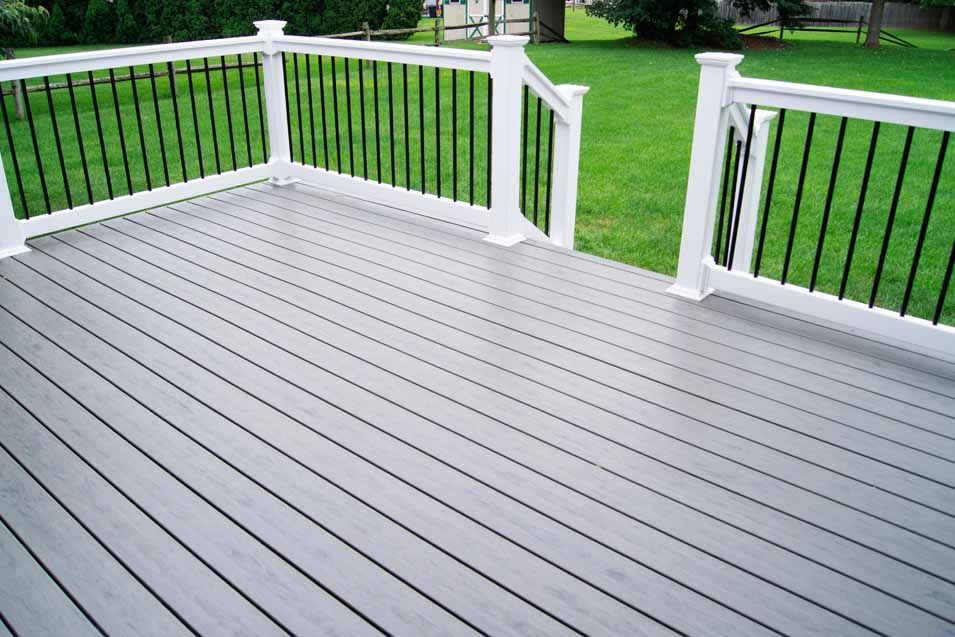
When it comes to deck building, two materials are typically used more often than others. Natural wood and synthetic (or composite) wood. The differences between the two materials can be stark to some and slight to others and knowing which you will prefer will largely come down to one’s tastes.
When choosing a material to build a deck with, the main difference between synthetic wood and natural wood comes down to differences in style, natural feeling, price, and durability. While the two may seem similar, they are actually very different materials options to consider when building and maintaining a deck.
We will look into all of the benefits and considerations when it comes to building a deck below.
The Pros and Cons of Composite Wood Decking
Let’s first look at composite wood. Event though it is not a natural material, it still maintains a few advantages over natural wood decking.
Pros of Using Composite Wood
- More Durable Material: Composite wood is much more hardy when it comes to problems such as splintering, cracking, or fading due to sun exposure. While not as rugged as other decking materials – like PVC – synthetic wood is a much more durable choice out of the two synthetic options;
- Eco-friendly: If having a deck made from recycled materials appeals to you, a composite deck just may be the ticket. Composite wood is made of a mixture of wood, plastic, and binding agents. Many providers of composite decking offer composite wood decking materials that can be made out of such recycled resources. This is a more earth-friendly alternative to harvesting more trees;
- Comes in a Variety of Colors: Due to its artificial nature, synthetic wood is available in a variety of colors and stains that aren’t seen in nature. This can help a deck stand out, but to some, the look may just reinforce the man-made origins of the decking materials.
Cons of Using Composite Wood
- Still Requires Regular Upkeep: Despite being much less care-intensive when compared to a regular wood deck, decks that are made with composite materials aren’t maintenance-free. They will still require regular sweeping and washing just as any other deck would;
- Unnatural: For those that want a real wood look and feel or nothing at all, the fact that composite decks are man-made is likely a deal-breaker. For those that don’t mind a facsimile of the real thing, the other benefits of synthetic materials may make this point a non-issue;
- More Expensive: Finally, it must be stated that composite boards can be many times more expensive than natural wood boards. A deck done with composite materials may be up to 20% more expensive in terms of materials when compared to a natural wood deck.
The Pros and Cons of Natural Wood Decking
A natural wood deck will be more attractive to some homeowners based on style and price point alone. However, there are still different considerations to bear in mind.
Pros of Using Natural Wood
- Natural Style: This material is the genuine article, with the natural wood grain and color that is nearly impossible for synthetic wood to replicate;
- More Economical: When comparing the raw cost of materials, the use of natural wood normally is the more cost-effective choice. As we have seen recently, however, the price of lumber can also be subject to wild swings in the market;
- Requires Less Material: Besides being the only deck-building material that removes carbon from the atmosphere, wood is also more efficient to use because it requires less raw material when compared to synthetic wood.
Cons of Using Natural Wood
- Not as Durable a Material: As should be pretty clear by now, natural wood will never be as durable of a deck material choice as synthetic wood can be. However, this doesn’t mean that a natural wood deck can’t last a lifetime if properly maintained. While this will require more frequent care – such as sanding, staining, or replacing floor boards, they are well worth the extra cost in terms of time and money;
- Requires More Maintenance: As has been mentioned previously, natural wood will be more susceptible to cracking, splintering, and other issues that will require thorough fixes to keep your deck in usable condition.
Composite Versus Natural Wood: How to Choose Which Is Right for You?
So, now that we’ve looked at both options in more detail, hopefully, the choice of which material you prefer has become clearer.
Of course, if you’re still stuck as to which to choose, consulting your local deck builder is always a good next step. This is because the local pros in your area will be able to let you know which material typically holds up best within the respective geographical location. After all, deck builders in Glen Mills, PA are more likely to have an idea of what materials will work best in their area, so trusting their expertise is often the way to go.
In conclusion – besides differences in cost and durability – the main differentiator between synthetic and natural wood will only matter to those who already have a preference for one over the other. So, if you still can’t pick between the two, consulting with your local decking pros can help elucidate your options.





